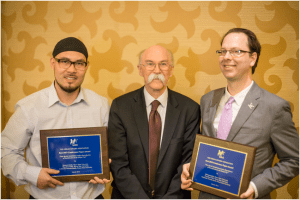
Paper presented at the 2015 UAA conference
Award Recipients
Theodore Pride (Wayne State University), Catherine Schmitt-Sands (Wayne State University), and Richard Smith (Wayne State University)
Award Committee Assessment
The Committee finds that the paper, “Does Spatial Assimilation Lead to Reproduction of Gentrification in the Global City?,” to be very well written, and that it provides important insights on neighborhood change. The research improves our understanding of the behavior of neighborhoods as they change and adjust to new populations. The research makes use of the National Neighborhood Change Database describing census tract characteristics as they have changed over a span of many decades. The research employed both direct counts and differences-in-differences methodologies to explain variation between matched pairs of tracts. The research finds that gentrification and spatial assimilation are correlated as expected. What is new is that the long time-span of the data reveals that gentrification is increasing, while spatial assimilation has plateaued. The research goes on to calibrate the scale of gentrification finding that a typical Core-Base Statistical Area contains only 2 gentrifying tracts out of a total of 163. With these new insights developed through a spatially broad dataset, this manuscript makes a significant contribution to the literature on gentrification. The discussion has broad appeal to scholars and practitioners working in thousands of urban spaces.
Award Committee
Chair: Kirk McClure, University of Kansas;
Members: Bernadette Hanlon, Ohio State University; Joan Wynne, Florida International University; Sarah Hughes, University of Toronto; Deborah Sotto, Urban Environment Research Group; J.R. Estes, Portland State University
Award Winners Bios
Theodore Pride received his Ph.D. from Wayne State University. His research focuses on the role of urbanization in social change under capitalist and racist social relations and accumulation. His dissertation, titled “Resident-led Urban Agriculture and the Hegemony of Neoliberal Community Development”, examines how the utilization of urban gardening as a community development tool by low-income residents can produce exclusionary spaces through eco-gentrification. It challenges the concept of human agency as resistance in resident-led community building, and demonstrates agency as adjustment to neoliberal restructuring.
Catherine Schmitt-Sands is a PhD candidate in political science with a concentration in public policy at Wayne State University. She is currently completing her dissertation on the topic of democracy, political centralization, and food security in developing countries. She has served as a graduate teaching assistant in the Department of Political Science and as a graduate research assistant in the School of Social Work at Wayne State. She earned her BA and Master’s degree in political science from Wayne State University.
Richard Smith is an Assistant Professor of Social Work at Wayne State University. He serves as chair of the master’s of social work concentration called Innovation in Community, Policy, & Leadership (I-CPL). His primary line of research seeks to understand the mechanisms and impact of interventions to improve community well-being (e.g., reduction of concentrated poverty & spatial inequality). For example, he has been working with Ecocity Builders of Oakland, CA to develop standards for sustainable community development. Since coming to Detroit, MI, he has been working with Focus: HOPE, Inc. on developing measures for their Hope Village Initiative. His forthcoming work will involve comparing ways local governments promote age-friendly and immigrant-friendly communities. Smith earned a doctorate in social welfare from the University of California, Berkeley. His dissertation research on Federal Empowerment Zones was funded by the U.S. Department of Housing and Urban Development. He also has a master’s degree in social work from the University of Michigan; and a master’s of fine arts from Western Michigan University. His work has been published by Urban Studies, Economic Development Quarterly, Social Work, Journal of Sociology and Social Welfare, International Journal of Social Welfare, Letters in Spatial and Resource Sciences, and other journals.





